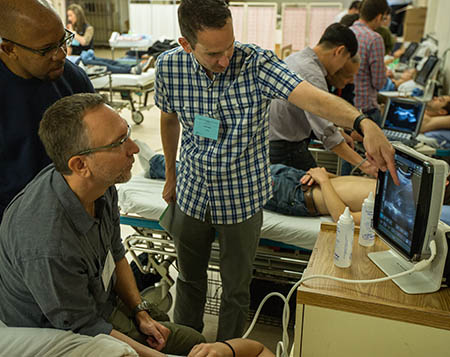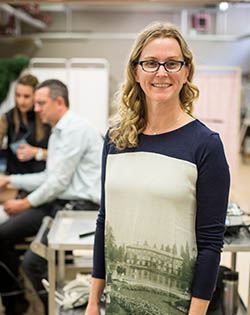
Dr. Blair Stanley (seated left) completed the point-of-care ultrasound (POCUS) program in 2015. Photo credit: Nick Diamond Photography/UBC CPD
Born and raised in Trail, British Columbia, Blair Stanley knew he wanted to go back to his hometown after finishing medical school.
Despite knowing the challenges that can often face rural physicians, Dr. Stanley wanted to be home, helping the people in Trail and the rural communities surrounding it.
“I’m now a family physician in Trail and do emergency medicine in Castlegar,” he said. “But unlike big emergency units in the city, we don’t have people on call who can provide ultrasound, X-Ray or CT scans.”
When Dr. Stanley heard about the Hands-on Ultrasound Education (HOUSE) program being offered to rural physicians and medical residents by the UBC Faculty of Medicine’s Rural Continuing Professional Development (RCPD) team, he immediately registered.
“It has been absolutely invaluable,” he said. “It’s given me the confidence and skills to use point-of-care ultrasound (POCUS) if I need it during a clinical exam.”
Bone fractures, shortness of breath, a collapsed lung, blood clots, ruptured spleens, heart failure, kidney disease and obstetrics can all be further investigated using ultrasound at the bedside and HOUSE offers training in all of them.
“It helps me diagnose things in the emergency department more quickly,” said Dr. Stanley. “Which basically translates to getting patients the care they need faster.”
A program built for rural physicians and communities
Since its launch in 2015, the program has trained and supported over 150 rural physicians in POCUS, many of whom are distributed UBC clinical faculty members.

Dr. Tandi Wilkinson.
Word of HOUSE is also spilling over B.C. borders – garnering national and international buzz in places like Ontario, Alberta, the Northwest Territories and Australia.
“I think the idea of HOUSE is taking off in rural areas across Canada because it’s innovative and designed to meet the needs of rural communities and patients,” said Tandi Wilkinson, HOUSE Course Director. “It’s flexible and mobile, so we go into rural communities and work with physicians based on their current skill level.”
Dr. Wilkinson says that while POCUS does not replace formal radiology exams, it does offer physicians an extra tool that can extend their clinical exam – a way of looking into the body to see what is going on in real time.
She also explained that the program is continuously improving, creating innovative opportunities so that rural physicians will continue to have access to ultrasound education.
This year, HOUSE will add educational videos and virtual mentorship sessions for participants who want to review specific cases or who would like more information. Other new additions will help create community networks for rural POCUS users so that they can get the support they need, when they need it.
Improving rural health
Sharon Fehr knows firsthand what rural frontline physicians face. She worked as a rural locum physician in B.C. and the Northwest Territories before settling in Calgary. She now works as an emergency physician in Lethbridge.
Dr. Fehr is also a regular instructor for UBC’s HOUSE program – flying out every few weeks to train physicians in POCUS.
“I began my ultrasound training two years ago in Yellowknife with limited resources,” she said. “It has completely changed the playing field because it gives me useful information at the bedside that helps with making critical decisions about a patient’s care.”
Like anything, Dr. Fehr said there is a learning curve to POCUS but that after two days of intensive hands-on training, participants will feel more comfortable and confident to start using POCUS in their everyday practice – and most importantly, they will learn how to use it safely.
Dr. Stanley echoes the same sentiment.
“Prior to the program, I never really used ultrasound,” he said. “Now I use it at least once during every shift.”
The HOUSE program was developed and is operated by the UBC Faculty of Medicine’s Division of Continuing Professional Development (CPD) in partnership with the Rural Coordination Centre of BC within the UBC Rural CPD program. Funding for the HOUSE program was provided by the Joint Standing Committee on Rural Issues, a joint committee of the Doctors of BC and BC Ministry of Health.
For more information on the HOUSE program, please visit the UBC CPD website.